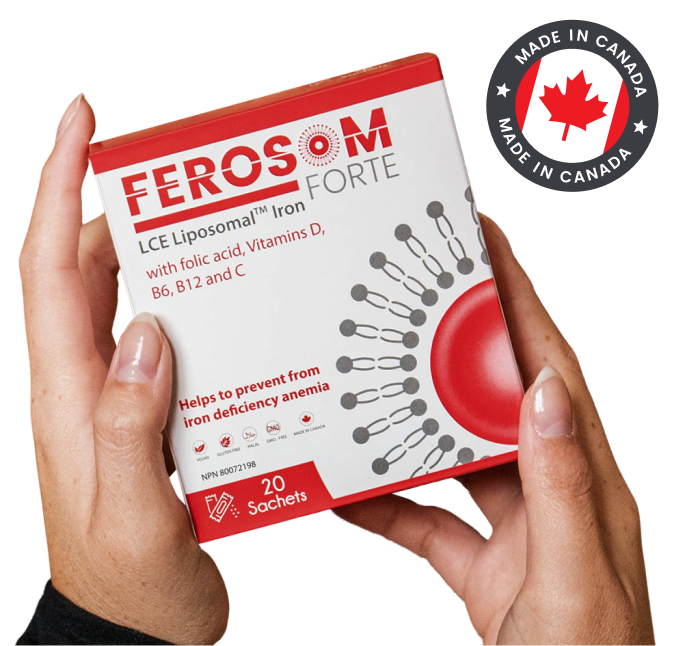

Living with Crohn’s disease is hard enough. Add in iron deficiency anemia, and it makes day-to-day activities feel even more challenging. Unfortunately, that’s the reality for over a third of people with Crohn’s.
Anemia is so common in Crohn’s disease, that it often feels like part of the deal. Symptoms of anemia, like fatigue or headaches, can easily get mistaken for just another Crohn’s symptom. In reality, there are ways to relieve those low iron pains while working to heal the underlying condition.
So, why does Crohn’s usually come with a big side of anemia? And what can you do about it if you or a loved one is living with the condition? Keep reading for all the answers.
What is Crohn’s disease?
Let’s begin with the basics. Crohn’s is a type of chronic inflammatory bowel disease (IBD) that works exactly how it sounds: causing inflammation in the digestive tract. This makes it hard for your body to not only break food down, but to use food in all the ways it’s supposed to. It’s like a not-so-perfect storm for abdominal pain, diarrhea, weight loss, and malnutrition.
But one of the most common symptoms of Crohn’s is actually fatigue. You might feel out of it, unenergized, or just plain tired. Why? Because about 45% of people who have IBD also have iron deficiency anemia.
Does Crohn's disease cause iron deficiency anemia?
You bet. And it’s the most common type of anemia in Crohn’s disease.
Iron deficiency anemia is when your body lacks hemoglobin — the superhero protein in red blood cells that helps to carry oxygen to the rest of your body. It comes with some pretty awful side effects, such as:
- Fatigue
- Weakness
- Headaches
- Dizziness
- Shortness of breath
- Cold hands or feet
- Pale skin
- Irregular heartbeat
If you have Crohn’s or another type of IBD, it’s recommended that you get your iron levels checked every 6 to 12 months.
How does Crohn’s disease cause anemia?
Unfortunately, there isn’t just one simple answer. Crohn’s disease can lead to anemia for a number of reasons.
The first? Bleeding in the digestive tract. Crohn’s can cause ulcers to sneak underneath the inner layer of the intestines, forcing blood vessels to break open. When the body loses that much blood, it also loses a lot of hemoglobin. Enter: anemia. In fact, blood loss is one of the most common causes of anemia in IBD.
According to James F. Marion, MD, a gastroenterologist and IBD expert, most people with Crohn’s don’t realize that they’re losing blood. Since it happens slowly over time, they might not even experience symptoms.
Another way Crohn’s can cause low iron is through inflammation and swelling. When your body is inflamed, it can’t absorb as much iron as you need. That’s one of the reasons why about 70% of people with Crohn’s need surgery to remove the parts of their digestive tract that are most impacted by inflammation and blood loss.
A Vitamin B12 deficiency might also be the culprit. All that inflammation makes it harder for your intestines to absorb B12 naturally. This can lead directly to decreased hemoglobin and low ferritin Crohn’s disease.
And on top of all that, Crohn’s disease makes it hard to tolerate certain foods. If those foods just so happen to be your main source of iron, that alone can lead to a serious iron deficiency.
What can someone with Crohn’s do to boost their iron levels?
If you think you have iron deficiency anemia, the best course of action is to treat Crohn’s disease itself. But to start increasing your iron levels (and easing your symptoms) in the meantime, an iron game plan is key.
You can start by adding more iron-rich foods to your diet, as long as they don’t aggravate your Crohn’s. Foods that are high in iron include:
- Red meat and poultry
- Beans
- Dark green leafy vegetables, like spinach
- Seafood
- Peas
- Iron-fortified breads and grains
In more serious situations, your doctor might recommend IV iron infusions. This is a quick and direct way to increase your iron levels, especially if your symptoms of anemia are starting to impact your quality of life.
But if needles make you a bit squeamish, the most effective, consistent, and convenient way to boost your iron is a high-quality oral iron supplement.
What’s the best iron supplement for Crohn’s?
Many iron supplements cause harsh gastro-intestinal side effects. If you suffer from Crohn’s, that’s basically the opposite of what you want. That’s why Ferosom Forte is the only LCE coated oral iron supplement in Canada proven to treat anemia caused by Crohn’s and chronic inflammation in IBD.
Non-absorbed iron is actually proven to be toxic for people with Crohn’s disease and can make their symptoms worse. On top of that, chronic inflammation in the gastro-intestinal tract releases a hormone called Hepcidine, which is known to suppress your body’s ability to absorb oral iron.
Here’s where Ferosom Forte comes in. It’s microencapsulated in Liposomal form, which means it doesn’t have to be converted for your body to absorb it. Plus, its absorption isn’t regulated by Hepcidin.
The result? Extremely high, IV-level absorption rates. And best of all, you can protect your digestive tract from going through any more harm.
Available in capsule and sachet form, Ferosom Forte is doctor recommended, made in Canada, and paired with Vitamin C in each dose to make absorption even easier.
Living a healthy, fulfilled life with Crohn’s disease.
Although there’s no cure for Crohn’s yet, the condition can be managed with the right medication, procedures, and supplements. Work closely with your doctor to develop a unique treatment plan, including supplements like Ferosom Forte. By keeping iron deficiency anemia at a distance, you can focus on the most important thing: feeling healthy, strong, and in full control of your Crohn’s.






